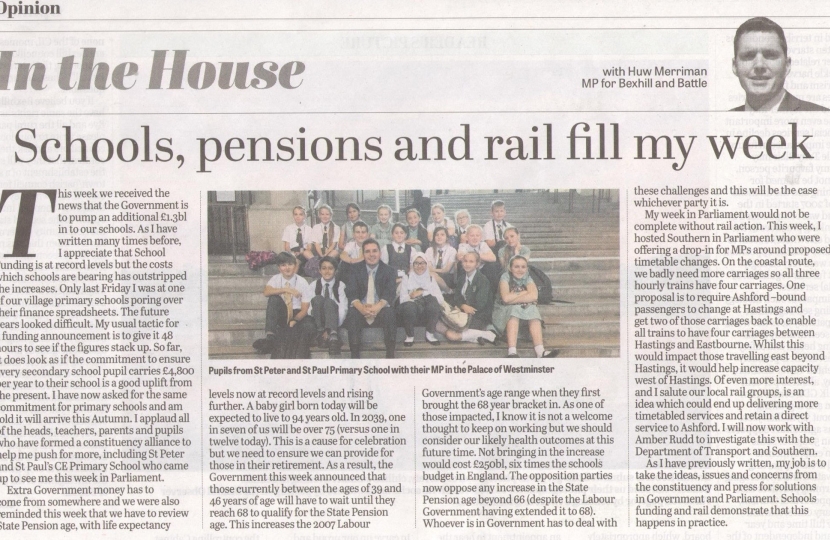
This week we received the news that the Government is to pump an additional £1.3bl in to our schools. As I have written many times before, I appreciate that School Funding is at record levels but the costs which schools are bearing has outstripped the increases. Only last Friday I was at one of our village primary schools poring over their finance spreadsheets. The future years looked difficult. My usual tactic for a funding announcement is to give it 48 hours to see if the figures stack up. So far, it does look as if the commitment to ensure every secondary school pupil carries £4,800 per year to their school is a good uplift from the present. I have now asked for the same commitment for primary schools and am told it will arrive this Autumn. I applaud all of the heads, teachers, parents and pupils who have formed a constituency alliance to help me push for more, including St Peter and St Paul’s CE Primary School who came up to see me this week in Parliament.
Extra Government money has to come from somewhere and we were also reminded this week that we have to review State Pension age, with life expectancy levels now at record levels and rising further. A baby girl born today will be expected to live to 94 years old. In 2039, one in seven of us will be over 75 (versus one in twelve today). This is a cause for celebration but we need to ensure we can provide for those in their retirement. As a result, the Government this week announced that those currently between the ages of 39 and 46 years of age will have to wait until they reach 68 to qualify for the State Pension age. This increases the 2007 Labour Government’s age range when they first brought the 68 year bracket in. As one of those impacted, I know it is not a welcome thought to keep on working but we should consider our likely health outcomes at this future time. Not bringing in the increase would cost £250bl, six times the schools budget in England. The opposition parties now oppose any increase in the State Pension age beyond 66 (despite the Labour Government having extended it to 68). Whoever is in Government has to deal with these challenges and this will be the case whichever party it is.
My week in Parliament would not be complete without rail action. This week, I hosted Southern in Parliament who were offering a drop-in for MPs around proposed timetable changes. On the coastal route, we badly need more carriages so all three hourly trains have four carriages. One proposal is to require Ashford –bound passengers to change at Hastings and get two of those carriages back to enable all trains to have four carriages between Hastings and Eastbourne. Whilst this would impact those travelling east beyond Hastings, it would help increase capacity west of Hastings. Of even more interest, and I salute our local rail groups, is an idea which could end up delivering more timetabled services and retain a direct service to Ashford. I will now work with Amber Rudd to investigate this with the Department of Transport and Southern.
As I have previously written, my job is to take the ideas, issues and concerns from the constituency and press for solutions in Government and Parliament. Schools funding and rail demonstrate that this happens in practice.


